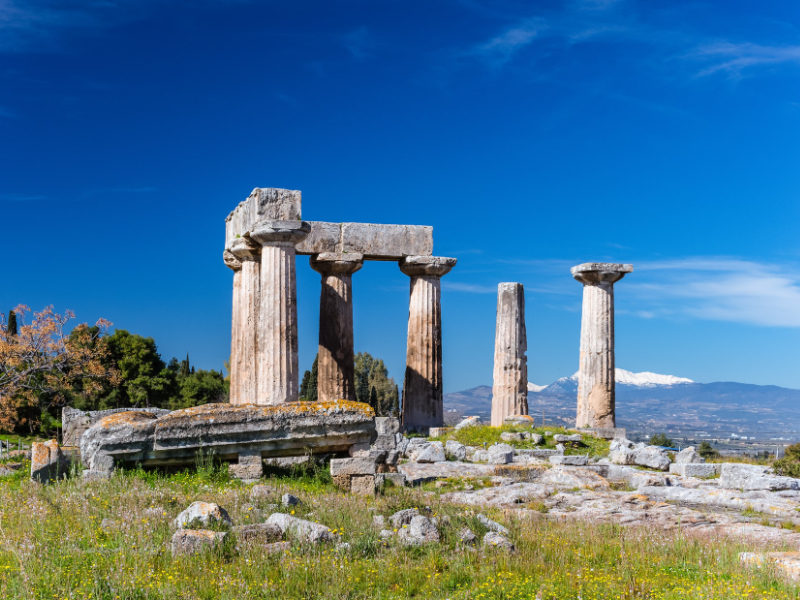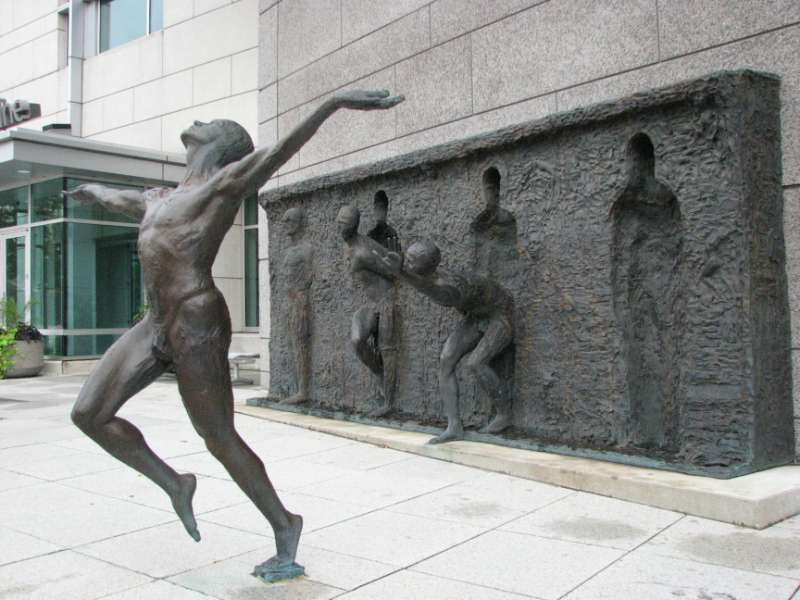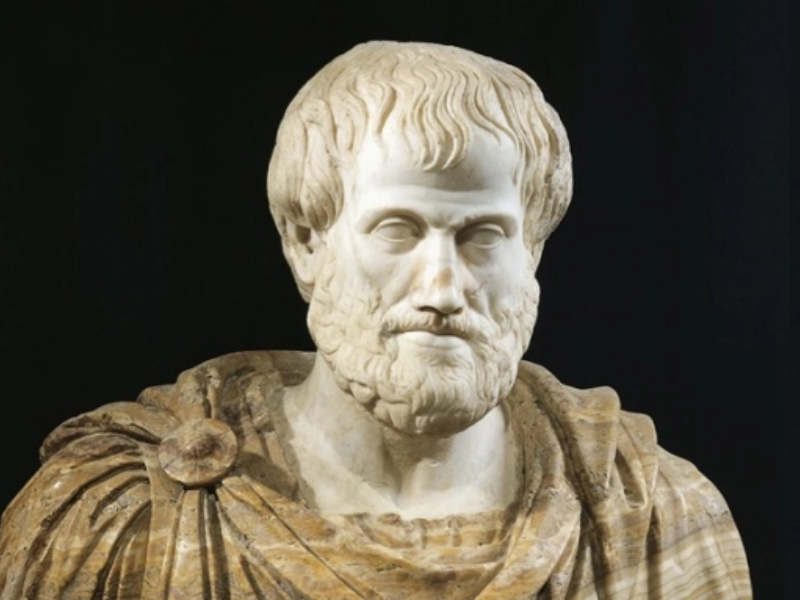Plato’s Moral Tyranny
– Plato’s War Against Freedom –

As we saw in Part 1, before we distinguished social norms from natural laws, our behaviors would have seemed as natural as the seasons — each were believed to be controlled by the gods. No one, then, would have thought to question whether something was right or wrong, since matters of right and wrong were already spelled out by the gods — or nature.
As civilizations grew, however, and cultures clashed, we finally realized that social norms are quite different from natural laws. Social laws are created and enforced not by god — or nature — but by each of us.
Only you, the individual, can decide whether a behavior, norm, or institution is right or wrong. It is your burden and yours alone. You can’t shift it to god, nature, history, or even to society. Because, whatever authority you accept for your beliefs and actions, it is still you who must accept that authority.
This, of course, is no easy task. It takes great courage to navigate the darkness of your ignorance in search of a better life. Many Greeks, feeling suffocated by the new burden, tried to shift it back to god — or nature. And a few assholes, aware of the strain it created on society, tried to use it as leverage to maintain their power, to return to the so-called ‘natural’ state — where the rulers rule, the workers work, and the slaves slave.
One of the earliest attempts was put forward by the Greek poet Pindar. It is natural law, he argued, for the strong to make slaves of the weak. Democracy, or anything else that protects the weak, is not only arbitrary but a disgraceful perversion of god’s natural law.

Many ‘naturalistic’ arguments have been proposed since Pindar — many out of fear, some with good intentions, and others…not so much. And, though most of these arguments admit that we do in fact create our own social norms, they nevertheless claim that our norms must ultimately rest on nature.
I see at least two common objections to these arguments.
First, I’m not sure nature’s the best place to rest your morals. I mean, isn’t it more natural to leave our clothes behind? The farther we trace our lineage back, isn’t it more natural to rape than ‘make love’? Shouldn’t you give up your cellphone, car, and home? What about the arts and sciences?
Isn’t it obvious? If you want moral progress, you can’t look back at god or nature. You gotta look forward—out beyond the Wall and into the darkness of your ignorance.

The second point these naturalistic arguments overlook is the fact that it’s still on you to decide which aspects of nature to ‘ultimately’ rest your morals on. And, as I’m sure you know, we each have several competing ‘natural’ instincts. Just consider another argument put forward in the same vain by Antiphon:
‘The nobly born we revere and adore; but not the lowly born. These are barbarous habits. For as to our natural gifts, we are all on an equal footing, on all points, whether we now happen to be Greeks or barbarians…we all breathe the air through our mouths and nostrils.’
No doubt Antiphon’s heart is loads superior to Pindar’s. But his claim is just as unstable. No matter what aspect of nature you rest your morals on — whether it be your narcissistic or empathetic tendencies — you still gotta decide to rest them there.
Once you’re aware of a behavior, there’s no escape, only you can decide whether to continue the behavior, change it, or stop it.
In any case, though I think Plato was aware of the weaknesses in these naturalistic arguments, he nevertheless tried to rest his moral and political theory of tyranny — the Philosopher King — on the natural inequality of people.

No two people are alike, he claims. And no one is self-sufficient. Each of us has a peculiar nature — some are fit for one type of work and some for another. To further our own interests, then, we gather in one place to share our goods and services.
Okay. So far, so good. He’s essentially beat Adam Smith to his theory of the division of labor. But, in the end, the only important division, for Plato, turns out to be the one between the wise philosophers—that is, the city’s rulers — and the rest of us fools.
Let’s see how he got here.
Plato’s aim is simple: Arrest all political change! Why? Because, for him, the material world consists only of copies of those perfect forms and ideas which exist for eternity in the immaterial realm. And these material copies, he argued, decay from their perfect form. To stop the decay, then, Plato made it his aim in the Republic to arrest all political change in order to maintain the ideal state, the natural state, where the rulers rule, the warriors war, and the workers work.
Those who can peer into the realm of forms — that is, the wise philosophers like Plato — will tell you that the ideal state requires strict class division. And, since the state is in the hands of its rulers, all efforts shall be aimed at preserving the ruling class. The ruling class, then, is in charge of the military. Also, only the ruling class will be educated. And all other intellectual activities will be prohibited. Anyone outside the ruling class who innovates in education, legislation, or religion, will be put to death.
Whoa! What happened here? Didn’t Plato’s teacher Socrates give his life to defend the individual’s right to pursue wisdom for herself? And didn’t he also defend the egalitarian theory of justice — that is, the unprejudiced and equal treatment of free citizens under the law? How, then, did Plato get here — defending a tyrannical government, one like the Athenians’ archenemies, the Spartans. And how did he expect his fellow Athenians to go for it?

Plato knew, of course, he’d have to pull some intellectual gymnastics to sell this to the Athenians. So, he laid a classic bait-and-switch. Because even the word ‘justice’ carried so much weight in Athens, Plato knew it would be hard for people to turn their backs to ‘justice,’ even if he had tainted its meaning a bit. So, he stirred up some confusion and laid the bait.
After Plato’s fictional Socrates, in the Republic, speaks about how the rulers will be the city’s judges, Socrates asks his interlocutor Glaucon, ‘Will it not be the judges’ aim to make sure that no man takes what belongs to another?’ — ‘Yes,’ Glaucon replies. — ‘Because that would be just?’ Socrates asks. — ‘Yes, because that would be just.’
The two therefore establish that to keep and to practice what belongs to one’s own is justice. Okay, fair enough.
But here comes the switch. ‘Now see whether you agree with me,’ says Socrates. ‘Do you think it would harm the city if a carpenter became a shoemaker and the shoemaker a carpenter?’ — ‘No,’ says Glaucon, ‘not very much.’ — ‘What about if someone who by nature was a worker became a member of the ruling class?’ Socrates asks. ‘Would this kind of underhand plotting mean the downfall of the city?’ — ‘Most definitely it would,’ replies Glaucon. — Socrates continues, ‘We have three classes in our city, and I take it that any such plotting or changing from one class to another is a great crime against the city and ought to be considered utterly wicked, no?’ — ‘Certainly,’ Glaucon confirms. — ‘And you would agree that such wickedness towards one’s own city is injustice?’ — ‘I would.’ — ‘Then, this is injustice,’ Socrates concludes, ‘And, conversely, it is just when each class attends to its own business.’
There you have it. This is how one of the most adored philosopher in history tactfully commandeered the meaning of justice in order to pursue his political theory of tyranny.
Throughout Plato’s political writings, it becomes clear that he doesn’t care about the individual’s freedom. He cares only about the philosophers, the ruling class — that is, himself — which he disguises as the ‘ideal state.’
In fact, in his Laws, when describing the Constitution of the Republic as the highest form of the state, he tells us that there shall be common property of wives, children, and chattel. Life shall be spent in total community. We must do all that is possible to eliminate private possessions. From childhood on, we should stand under leadership. All traces of anarchy and independence shall be eradicated. And all people and all laws shall be used to protect the state (a.k.a., him and his homies).
Plato’s morality is simple: something is ‘good’ if it furthers the interest of the state, and ‘bad’ if it hinders it. Consider the implications of this moral system. The state can never be wrong in its actions as long as it is strong, as long as it survives. It can lie, cheat, steal, and kill so long as it is ‘good’ for the fictional state.
Plato even goes so far as to argue that, because us unsophisticated folk can’t grasp logical arguments, the rulers should tell lies and create religious myths to persuade us to do what is in the best interest of the state. And anyone who’s beliefs deviate from those of the state shall be sent to the inquisitors. And, if he refuses to retract his heresies, he will be put to death.

Did Plato forget that his dear teacher was sentenced to death just twenty years earlier for this very charge? Socrates gave his life to defend reason. And now, Plato, his most brilliant student, was trying to destroy it.
But why? I can only imagine to become Philosopher King. After all, Plato tells us that only few are eligible for the post. And it’s hard to deny that he speaks of himself when he says, ‘He who belongs to the small band [of philosophers]…can see the madness of the many, and the general corruption of public affairs. The philosopher…is like a man in a cage of wild beasts. He will not share the injustice of the many, but his power does not suffice for continuing his fight alone, surrounded as he is by a world of savages.’
And then there’s my personal favorite: ‘It is not in accordance with nature that the skilled navigator should beg the unskilled sailors to accept his command …. But the true and natural procedure is that the sick…should hasten to the doctor’s door. Likewise, those who need to be ruled should besiege the door of him who can rule; and never should a ruler beg them to accept his rule, if he is any good at all.’
What an arrogant little shit. Check me out, Plato says, your natural born king. But, don’t expect me to come begging to you fools. If you want me, get down on your knees and pray I accept the post as Philosopher King.
Conclusion
Plato couldn’t have strayed further from the humble teachings of Socrates. A wise philosopher in Socrates eyes is someone who admits she knows nothing. The wise philosopher understands that her knowledge, however impressive, will always be swallowed by her ignorance. And she knows that what little knowledge she has is likely wrong. She therefore commits herself to reason, the spirit of progress, in order to find and correct her errors, so that she may pursue a better life.
In Plato’s eyes, however, the wise philosopher is no longer a modest seeker of knowledge but a proud possessor of truth. He is an omniscient demigod king, who can peer into the immaterial Realm of Forms. The wise philosopher, to Plato, no longer encourages critical thought and open discussion. But instead indoctrinates minds. The wise philosopher makes people utterly incapable of having a free and independent mind. He must convince all to stand under leadership of the Philosopher King, using whatever lies and deceit are needed.
Poor Plato never did become Philosopher King. His ideal state was not realized until much later when, in the Dark Ages, the leaders of the Catholic Church became the privileged holders of divine truth.
More Articles
“Poetic Imagination”
I hope at least once in your life you’ve seen the Milky Way. The brushstroke of glimmering white light that cuts through the heavens is breathtaking. And to imagine, before all the light and carbon…
“Carving Knowledge from Our Imaginations”
Every civilization throughout history has created a dogmatic school whose main task is to pass on the doctrine of its founder intact to each generation. In the rare…
“Failures of Ultimate Explanation”
The earliest Greek philosophers didn’t really ask ‘what is?’ questions. Rather than quibble over the meaning of words, they tried to solve specific problems by creating bold explanatory theories…
“Plato’s Moral Tyranny”
Only you, the individual, can decide whether a behavior, norm, or institution is right or wrong. It is your burden and yours alone. You can’t shift it to god, nature, history, or even to society, because whatever…





